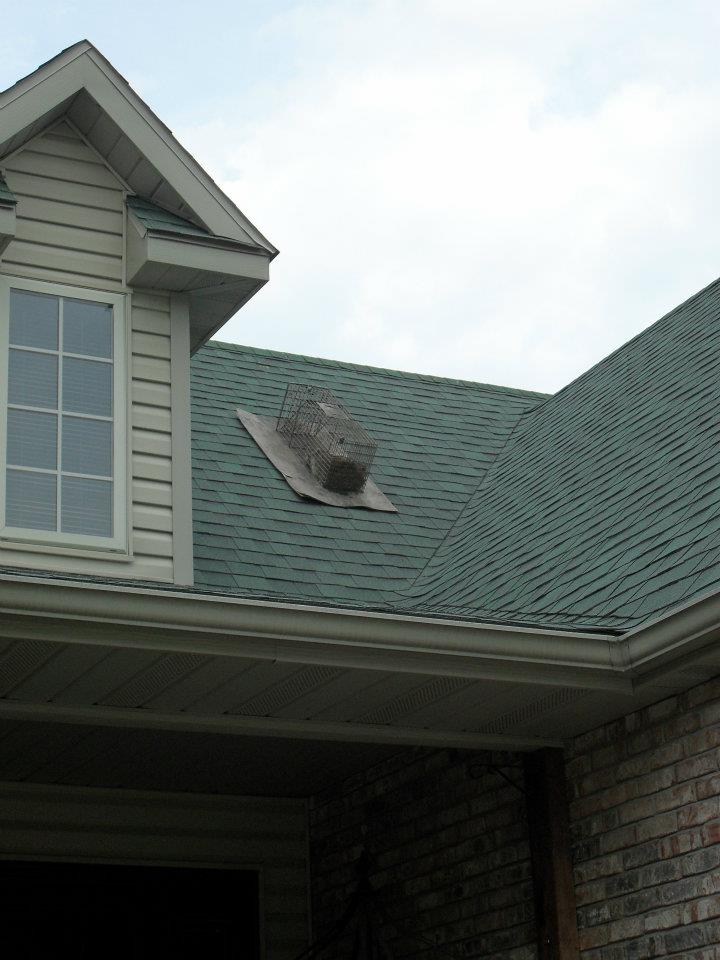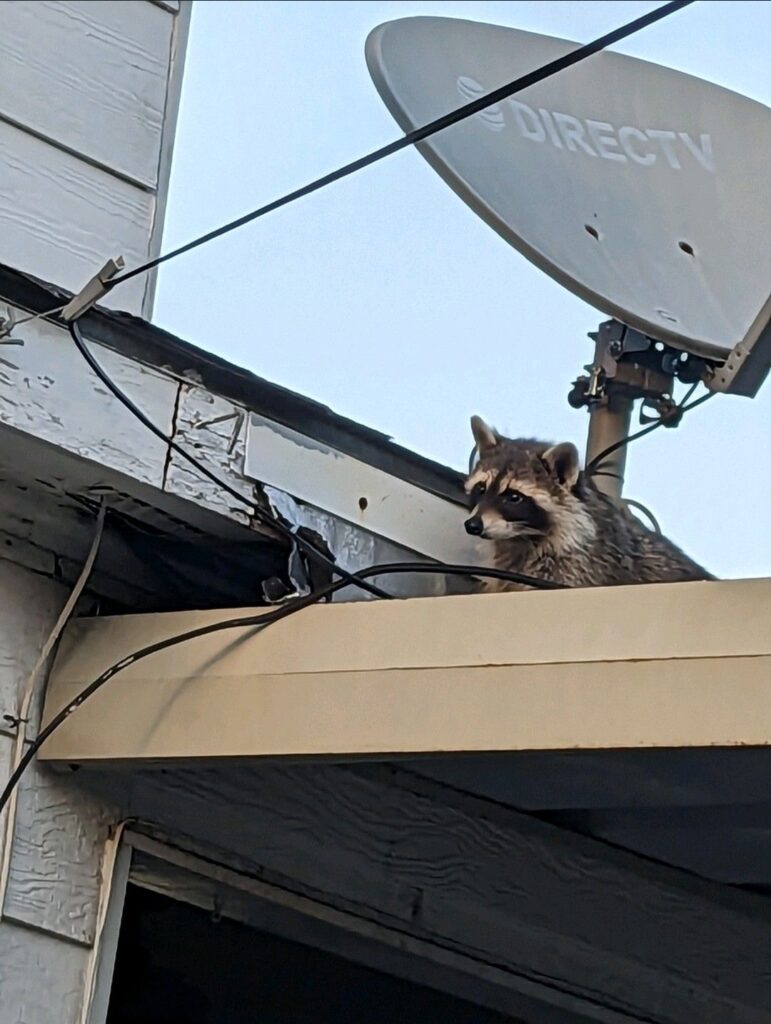Raccoons are fast becoming a common visitor to our backyards. As their natural habitats shrink, they’ve discovered the advantages of living in our homes: having a warm and safe place to give birth and raise their kits and access to the vegetables in our garden and the leftovers in our trash.
Unfortunately, it’s important to keep raccoons off your roof because the damage they do and the health risks they bring make them more than a nuisance. Raccoons on roofs or in soffits can signal a problem that requires professional attention. If you believe you have a raccoon frequenting your roof, call Critter Control for raccoon removal before you incur costly damage.
Signs of Raccoon on Roof
Raccoons are fast becoming a common visitor to our backyards. As their natural habitats shrink, they’ve discovered the advantages of living in our homes: having a warm and safe place to give birth and raise their kits and access to the vegetables in our garden and the leftovers in our trash.
Unfortunately, it’s important to keep raccoons off your roof because the damage they do and the health risks they bring make them more than a nuisance. Raccoons on roofs or in soffits can signal a problem that requires professional attention. If you believe you have a raccoon frequenting your roof, call Critter Control for raccoon removal before you incur costly damage.
What Are the Signs of a Raccoon Infestation on the Roof?
It’s hard to spot a raccoon on the roof mainly because they are nocturnal and most active at dusk and dawn. However, raccoons on the roof at night leave signs you can spot. Raccoons often access rooftops by climbing trees, siding, and drainage pipes.
Their presence is marked by:
- Smudges and hair on downspouts
- Claw marks on the trunks of trees
- 3- to 5-inch droppings in the same general area on the roof
- Purring, growling, chittering, or scratching
- Damaged attic vents or roofing
- Hair, smudge marks or actual sighting in chimney
What Do Raccoons on Roofs Sound Like?
Unlike small rodents that make quiet, skittering noises when moving about, raccoons will make loud thumping noises. You might also hear the scratching of their claws.
Raccoons are also very communicative and use their sounds to express affection, anger, and fear, as well as to speak to their kits. So you might hear raccoon-on-roof sounds, such as screeching, growling, hissing, and even purring.
Damage Raccoons on Roofs Cause
Raccoons on roofs cause significant damage. Once a raccoon creates or enlarges a hole in the rooftop, it becomes an easy pathway to the attic. Females are known to destroy soffits, fascia boards, shingles, vents, and insulation to establish denning sites. Since they like to keep their latrines separate from their nests, they will use leaves and pine needles to make a place on the roof for their droppings.
If you are experiencing roof damage from a raccoon, it is only a matter of time before they find a way to gain entry to your attic. That means it is a perfect time to call a professional wildlife specialist to keep raccoons off the roof.
Why Are Raccoons on My Roof?
Raccoons have recognized that living close to humans has advantages, such as access to shelter, food, and water. Raccoons on a roof at night are part of their normal activity as they are nocturnal, and nighttime is when they would be foraging for food or exploring their surroundings. Female raccoons also move about in the daytime to search for food for their kits.
Can Raccoons Live on the Roof?
Raccoons can live on a roof if there is adequate shelter, but it is more likely they are using the roof to come and go from the den they’ve set up in a vent or chimney.
How to Keep Raccoons Off Your Roof
There are measures homeowners can take to discourage raccoons on roofs. Since raccoons in suburban settings are on the rise, it pays to consult a professional wildlife service to take preventive measures. Aside from keeping trash cans sealed tightly, trimming tree branches close to your roof, and eliminating bird feeders and outdoor pet food, measures a professional service can help with include:
- Finding roof vulnerabilities and sealing all cracks and gaps
- Capping vents and chimneys
- Installing tree and roof barriers to prevent raccoons from climbing up to your roof in the first place
How to Get Rid of Raccoons on Your Roof
It takes very little time for raccoons on your roof and in your soffits to set up a den in your attic. Critter Control employs the most effective and humane tools and strategies to help you get raccoons off your roof and keep them off.
Many homeowners will try DIY tactics such as using strong smells, motion-detecting lights, and other simple deterrents, but raccoons are clever and quickly learn that these tactics are harmless to them.
Critter Control will thoroughly inspect your roof, attic, and property. They will then present you with a plan in which they will humanely trap the raccoons. The location of a raccoon trap on a roof is important to keep the raccoon safe. It must be secured onto the roof and protected from the elements. The raccoons will be carefully and legally relocated, and their kits will be taken care of as well.
Contact Critter Control today to set up a free inspection and discuss the ways they can help you with raccoons on roofs or raccoon removal.

The signs of raccoons on their roof, such as noises at night, scratching sounds, droppings, or damage to shingles and vents.
easy access to food sources, nesting opportunities, or safety from predators.
Potential damage includes broken shingles, torn insulation, chewed wires, and contamination from droppings.
They want to know about the removal process, whether humane traps will be used, and how the animals will be relocated.
Limiting resources to food, water, and shelter will keep raccoons from exploring your yard. Prevent access to your roof by trimming branches that hang over your roof. In extreme cases, metal around the corners of your house can stop raccoons from climbing.
Watch a Raccoon Climb into the Attic from the Roof
.
Get them out.
Keep them out.®
Experiencing a wildlife or pest issue? We can help! Complete this form and your local Critter Control® office will contact you to assist.
- How to Get Rid of Raccoons
- Are Raccoons Dangerous?
- Raccoon Trapping Service
- Raccoon Control
- Baby Raccoons
- Dead Raccoon Removal
- Raccoon Diseases
- Do Raccoons Hibernate in Winter?
- Raccoon Damage
- Raccoon Diet
- Raccoon Poop
- Raccoons In Yards
- Raccoons in Basements
- Raccoons in Chimneys
- Raccoons in Crawl Spaces
- Raccoons in Houses
- Raccoons in Trash
- Raccoons in Trees
- Raccoons in Walls
- Raccoon Sounds
- Raccoon Tracks
- Raccoons in Attics & Ceilings
- What Does a Raccoon Look Like?
